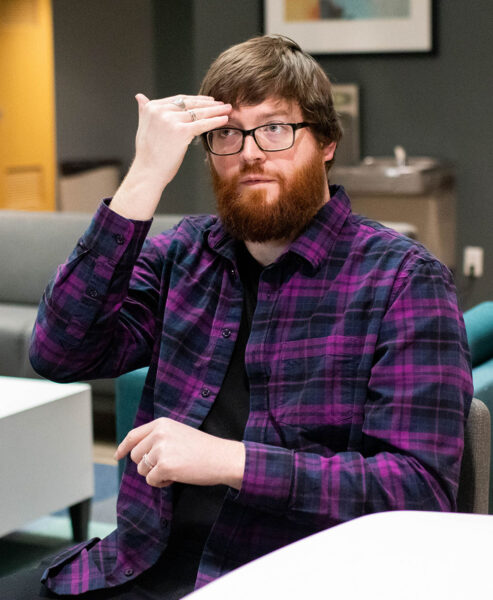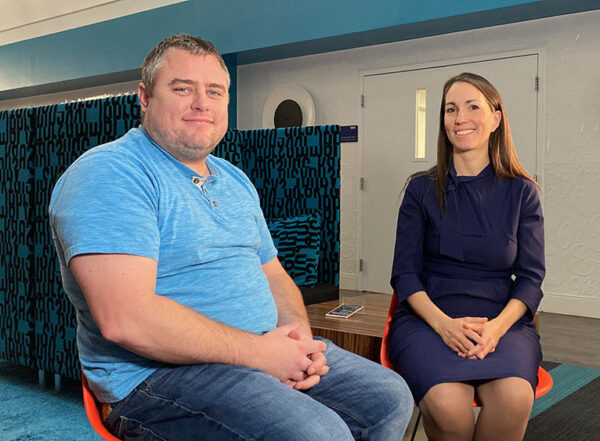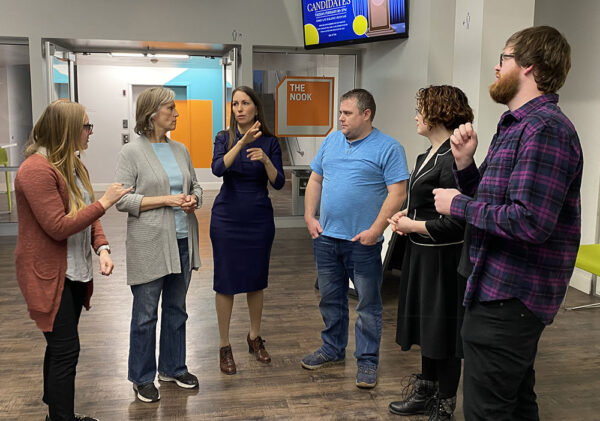Suspension of Deaf Education program leaves members of the Deaf community upset
By Jacee Caldwell and Michael Popa II
**Editor’s note: This article was updated at 9:21p.m. on Feb. 9 for clarification.
In an announcement released on Feb. 2, Dean Al Smith of the Emma Eccles Jones College of Education and Human Services announced the indefinite suspension of the Deaf Education Bilingual-Bicultural, or Bi-Bi, composite master’s program.
According to the Bilingual-Bicultural Composite Program’s page, the degree path prepares students to become classroom teachers serving Deaf children using American Sign Language. The program uses total immersion of ASL.
It’s also the only program in the state that produces Deaf and Hard-of-Hearing educators taught in this manner.
Other schools, such as the University of Utah, offer a combined bilingual-bicultural and listening and spoken language program, but doesn’t produce the same quantity or quality of Deaf educators as Utah State University’s degree path did, according to Michelle Tanner, the associate superintendent of the Utah School for the Deaf and Blind.
“Most of the teachers we hire that use an ASL-English bilingual-bicultural approach come from Utah State University. Within the state of Utah, they’re the primary pipeline that we have for teachers of the Deaf that use American Sign Language,” Tanner said.
Emma Cole, one of the students now formerly part of the degree path, created a petition to raise awareness on the closing of the program.
The petition has gained support from educators, Deaf and Hard-of-Hearing studies students, and many other community members, and currently has over 5,400 signatures.
On the petition’s webpage, Cole shares links to resources such as the National Association of the Deaf, which stresses the importance of early cognitive and language development to emphasize how critical having the degree available is for students.
The closure of the program also comes as the U.S. faces a critical teacher shortage, especially within special education.
Although, the suspension doesn’t come as a big shock to everyone.
Justin Bodily, a senior in the masters program who is also deaf and whose thoughts were interpreted by Emily Bergeson, said he’s been aware of internal struggles with the administration since the previous director of the Bi-Bi division, Dr. Freeman King retired but hasn’t seen any issues with the division as a whole.
“We were hoping that everything would be OK,” he said.

Pictured: Justin Bodily
And though ASL minor and classes will still be offered at the university, Bodily said it isn’t enough.
“ASL is not just something you can learn and then teach,” he said. “If you want to be a teacher you have to have that structure, have that wealth of knowledge, in order to take that language and then teach children material. People need to know that this is a big thing. This is really important.”
A letter sent to both USU President Noelle Cockett and Smith, from the Association of College Educators-Deaf and Hard of Hearing, or ACE-DHH, was given to the Statesman.
In the letter, Janice Smith-Warshaw, the president of the ACE-DHH, highlighted that the organization has “long recognized USU’s strong Bilingual-Bicultural Deaf Education program” and its staff should be “commended for consistently training highly skilled teacher candidates.”
After emphasizing the quality of the deaf educators produced by USU’s Bi-Bi track, Warshaw concluded the letter by encouraging USU administration to reconsider keeping the program to continue cultivating “the future highly qualified Deaf and Hard of Hearing Teachers who are competent (in) both ASL and English.”
Emily Bergeson, a certified ASL translator and member of the Deaf and Hard-of-Hearing community, said ending this program has a huge negative impact.
“It’s more than just devastating,” Bergeson said. “This is years of working to build up this program and now they’re shutting it down and, from our view, it’s like you’ve just rolled a boulder up a mountain and it’s finally there, and then they just shove it over the edge and you’re like, ‘What? How’d that happen?’”
Given such a dependency on USU-graduated Deaf educators, it came as a confusion to many why the program was suspended.
The first reason given came in an email to students within Bi-Bi on Jan. 6 from Karen Muñoz, the head of the Communicative Disorders and Deaf Education Department.
The email said the program was being “phased out” because their accreditation from the Council on Education of the Deaf, or CED, had lapsed in February 2021. Therefore, the program did not currently hold proper certification.
Muñoz also added in the email that they’ve been actively working to address the accreditation status issues, but had no luck with any resolutions.
After receiving the email, Cole said the feeling of devastation and confusion was an understatement.
Looking for answers, Cole decided to speak with Muñoz, but was quickly disappointed when Muñoz told her that the matter couldn’t be discussed in order to protect faculty.
In the public announcement from Smith that came almost a month later, Smith also claimed the reason had to do with accreditation.
An additional reason was then offered that after an internal review was conducted, the department saw the program was “not operationally sound, preventing us from offering the high-quality education expected at Utah State University.”
In an email sent to Bergeson who questioned it further, he shared that his responsibility as the dean is to, “ensure that our students receive the education we promise” and that if the department fails to meet standards for ASL instruction, then it’s doing more harm then it is good.
However, his description of the program’s poor infrastructure doesn’t match what educators and local leaders in the Deaf community, like Tanner, have seen from graduates.
“I’ve had this program at Utah State that’s been producing fantastic graduates on both sides,” Tanner said.
And not only did Tanner look to USU for deaf educators for deaf schools across the state because of the quality, but also because it was her only resource of finding qualified individuals for the job.
“That’s my only pipeline, and we just cut it,” she said.
With eight deaf schools in Utah, Tanner must now choose to recruit from out-of-state or look to train those who aren’t as educated. And already struggling to find teachers, this only worsens the problem.
In the same email to Bergeson, Smith said that most people are more focused on the temporary closure of the program. Instead, he wants the intention behind the decision to restructure the program to be the highlight of the announcement.
“My observation is that my effort to set expectations for excellence over the longer term are being missed (and) ignored, and that some parties are using this decision to air broader grievances that are not tied to the decision,” Smith continued in the email. “This risks undermining the collaborative process I would hope for as the department engages in strategic planning work.”
Despite Smith’s desire to focus on the future of the program and not the current closure of it, Deaf community members are still concerned with the consequences more than anything else.
“Small pebbles make ripples across a whole pond,” Cole said. “That’s the way it works with educators. Our graduates of USU go on to teach at not only Utah schools and fuel that program, but programs in states all around the country.”
Between accreditation claims and potential internal struggles, it still left those impacted wondering what the real reason was.
When asked to clarify, Smith said, “The accreditation had lapsed. We sought to address that, and the parties responsible were not responsive enough.”
The Council on Education of the Deaf, the organization charged with accrediting Deaf education programs in the U.S., then refuted Smith’s and Muñoz’s claims of lapse in accreditation in the public announcement.
The CED’s executive director Barbara Raimondo, released a statement shortly after Smith’s, saying he, “erroneously attributed the suspension of the Bilingual-Bicultural Track to the Council on Education of the Deaf.”
Raimondo continued by explaining the CED was not a part of the decision to suspend the program and they didn’t deserve the blame.
The statement read, “That decision was made by USU and USU alone.”
The CED also reached out to USU to have the statement corrected.
When asked about the supposed misinformation included in the original statement, Smith argued he never released false information and claimed it was simply taken out of context.
“It wasn’t reversed, it was clarified. The accrediting agency (CED) believes it was erroneous because people interpreted that to mean that the accrediting agency made the decision,” he said.
Despite the CED’s refutation of accreditation problems, Smith still insisted the program was facing an accreditation issue and “an accrediting body doesn’t dictate whether an institution has a program or not”, furthering the confusion of what the root of the program’s problems were.
Not only does this leave the community to wonder, but it leaves students and the Deaf community in the dark.
Adam Smith, a USU student and certified ASL translator, said. “Whatever is broken, just tell us what it is, just say what it actually is. We need honesty, just cut out the vague stuff, we don’t want that.”
When asked what people Smith thought his decision would affect and what the outcomes of the decision would be, Smith declined to comment.
Regardless of why the decision was made, members of the Deaf and Hard-of-Hearing community feel like their voice wasn’t considered nor heard in the decision-making process, especially since Smith isn’t a member of the Deaf community himself and never took consideration of the thoughts of those who are.
Dereck Hooley, a member of the Deaf community whose thoughts were interpreted by Emily Bergeson, shared that this announcement is a tragedy.
“It’s not OK because they didn’t even give people an opportunity to discuss the program, to make modifications. They should have talked with others to get an opinion,” he said.

Pictured: Dereck Wooley (Left), Emily Bergeson (Right).
Cole also made it clear that this decision isn’t one she agrees with.
“They need to know that it’s not going to happen without an uproar. It’s not gonna happen without them losing some reputation,” she said. “I like USU. I love it here. I don’t want to drag down the reputation, but I came here for that program and to take it away, it’s just wrong.”
Hooley added there is a misunderstanding between the Deaf and Hard-of-Hearing community and the administration.
“Maybe they don’t understand what the deaf program does. They don’t understand deaf culture. Maybe they don’t understand what the deaf community needs,” Hooley said. “Their action demonstrates and shows that (they’re) looking down on Deaf people.”
Hooley is one many who are upset about being excluded from discussion related to the decision.
Tanner also related to these grievances about not being considered and believes it would’ve been valuable, especially considering her position for USDB.
“I know I didn’t get asked. I know nobody asked my opinion,” she said. “I think that would have been a valuable opinion to ask if you were thinking your graduates aren’t up to snuff. I think my opinion would have been one you would have sought out.”
Bergeson and Cole shared these frustrations and organized a meeting on Feb. 8 between the administration and several Deaf and Hard-of-Hearing community members to address it.
The complete group in the meeting consisted of Smith, Muñoz, Bergeson, Cole, Hooley, Bodily, Savannah Sparks, Bronwyn O’Hara and Mykel Winn.
In an audio recording obtained by the Statesman of the meeting, the group expressed their concerns of the decision and its consequences, along with ensuring experts actively involved in Deaf education will be a part of the strategic planning process to reinvent the division in the future.
The group even offered resources on where to find the best people for the job, including professors from Gallaudet University, a private institution for Deaf and Hard-of-Hearing education.
Those in attendance also said they understood the dean’s position but expressed their desire to have their own voices involved to offer critical perspectives moving forward.
Due to inability to discern who was speaking in the audio recording in this scenario, we cannot attribute the following quote, however, it was brought up from someone advocating for the Deaf community.
“There might be things we agree or disagree on, but that is what we’re here to do. That’s what we want, we want to help you. We’re willing to contact out to find people to help figure out the situation, help you redesign this to reimagine it and what’s going to be best for the future to have the expertise in his program.”
Smith agreed having an external reviewer would be a great idea. But as far as the group having a strong input, Muñoz could only guarantee a communication plan.
“What I can’t promise is that I’m going to open the doors wide to anyone and everyone to understand,” Muñoz said. “There’s too many things that we have to worry about that understandably, the community doesn’t understand.”
Those in attendance hoped the meeting would finally give them the answers they’ve been looking for and address, as Cole refers to it, the secrecy and lack of communication on Smith’s and Muñoz’s end.
After over an hour of discussion, the group overall said they left feeling their voices and perspectives had finally been heard where they hadn’t before.
However, the problem isn’t solved and there is still a lot of work to do.
Bergeson said the meeting ended with Smith promising to keep more open communication with the Deaf community and those who are strongly affected.

Pictured: The group using sign language to communicate with each other after the meeting with the dean.
In order (left to right): Winn, O’Hara, Bergeson, Hooley, Cole, Bodily.
As for the future, the group felt optimistic that the program will return and hope it will be done in the right way, and they will continue to fight.
“We’re not going to give up, we’re not going to stop. We’re going to keep going and keep holding them and putting the pressure on to get them to do what they say they’re going to do,” Hooley said.
Smith said his action plan is included in the public announcement and will be addressed in two ways.
“First, the department will immediately address weaknesses in the foundational undergraduate program offerings in ASL to ensure the best quality experience for our students,” it reads. “Second, the department will engage in strategic planning that considers future workforce needs and opportunities as well as promising directions for growth.”
Exact action steps have not yet been offered by the department. However, students currently in the program will be able to finish and graduate by spring 2023.
And though Cole herself will not have enough time to finish the program like she had anticipated, she did say she appreciates Smith, along with the entire administrative staff, being responsive and accommodating during this time.
Ultimately, both sides agree the program is valuable and needs to make an eventual return to USU, however, no one can confirm how long that will take.
Regardless, Cole, Hooley, Bodily, Bergeson and others involved in the meeting feel accomplished for being able to bring awareness and show that no matter how small something may seem, anyone can make an impact.
“I felt like they were willing to listen because we were loud enough. We were loud,” Hooley said. “If we had sat back and been silent, then it would not have worked. I mean, there would’ve been a much more destructive outcome. But we stood up and we did something.”
-Jacee.Caldwell@usu.edu
-Michael.Popa@usu.edu

